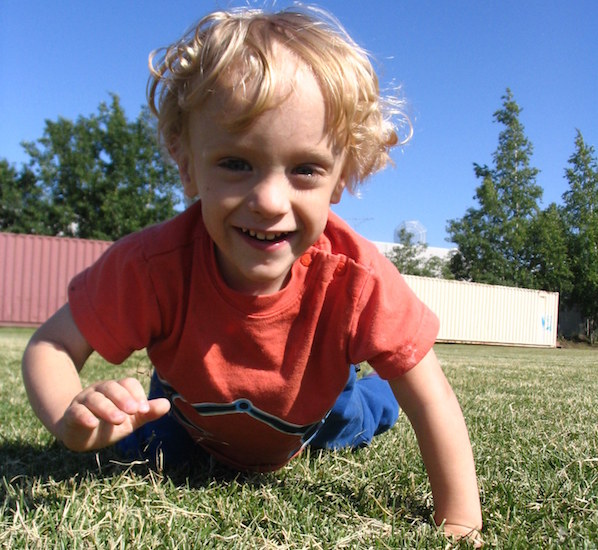It’s late again. No morning writing for me, unless you count 12:14 a.m. as morning.
But stolen midnight moments with these keys is an improvement from when I thought about writing but rarely practiced the craft of brewing meaning from words.
Oh, I kept a journal for years, but I often kept the same journal for years because I was a regular irregular writer.
Sort of like how my son, Elias, is a coordinated uncoordinated kid. The damaged part of his brain does not communicate directly with his muscles. There’s all sorts of technical terms for this delay but none that capture his ability to rotate his body mid-fall so he lands on his hands and knees instead of the back of his head that protects his damaged brain.
Damaged brain.
Brain damage.
Brain damage.
Brain damage.
Just thought if I said it enough times I could shake out the stigma attached to that term.
“Do you want a boy or a girl?”
“Oh, I don’t care as long as it’s healthy.”
What is it about sickness and disability that scares us so?
I’ve been posing a lot of questions lately. I’ve been sliding down the mountain instead of hauling my tired ass up to the ridge line.
And I can give you all kinds of reasons: I can whine about the time commitment of a full course load for a graduate program in which I sometimes wonder why I’m enrolled; complain that even though I gave my notice in July, a replacement NICU Parent Navigator didn’t step into the position I helped define until yesterday; grumble about Elias’s seven weekly therapy appointments that make our days a checkerboard of outings with no routine; gripe about my husband, Nick, getting to spend full days hunting and fishing when I haven’t taken a day off from striving toward parental or professional goals since the day the ultrasound told me to lie down; stew over the random chance of two unrelated professional opportunities presenting themselves during a month with too many commitments already crammed into its elevator of days.
(“Abater! Abater!” Elias would say if he was still awake and I dared to say that word — e-l-e-v-a-t-e-r — out loud. Then he would crawl to the door: “Car ride! Ready! Car ride! Abater!”)
But the truth is, along with the insane magical moments Elias brings, there is a back story of exhaustion, disappointment and fear. And perhaps I cloak myself in busyness to avoid falling.
If I just keep going then maybe I won’t surrender to the feelings that my love for Elias detests. The embarrassment when strangers watch him struggle to walk. The regret when a pudgy baby passes him on most milestone markers.
The “othering” that even a mother can do to her son when for a moment she sees the disability before the boy.
The shame in those words.
I want to only celebrate. To rejoice in the wonder of it all. I want something as elementary as an elevator to make me rise.
If only I could perpetually see the world through Elias’s 2-year-old eyes.
Most people with nystagmus do not see their eyes move when they look in the mirror. Their brains don’t register the extra beats to the sides but only see the centered pupils. Their brilliant brains figure out how to block the extraneous sensory information to create a stable picture. And the mirror reflects this steady gaze.
And as usual, with a sage for a son, I can learn from this.
Follow this journey on Following Elias.


